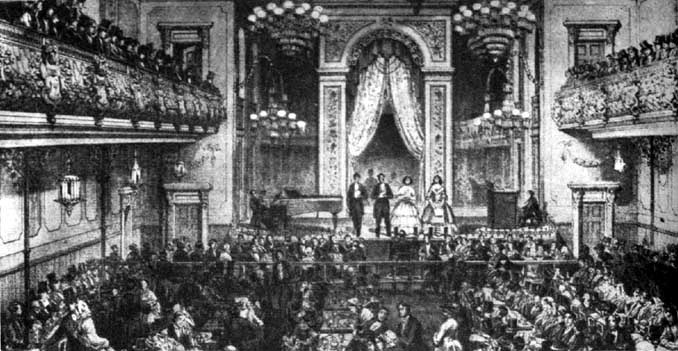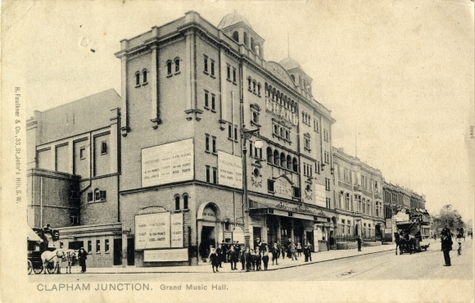
Weston Music Hall, ca. 1890 |
 |
|
| |
| In the late 19th and early
20th century, a British parallel to American vaudeville flourished in
and around London and Britain's other major cities. The earliest of these
originally featured entertainment and drink and grew out of so-called
"catch clubs" of the mid-17th to late-18th centuries. By the 1830s and
40s, London taverns with music licenses (e.g., the Mogul, Drury Lane)
provided an environment in which a largely working-class audience could
engage in song while they drank. All-male song-and-supper clubs (e.g.,
the Coal Hole, the Strand, and Evan's Late Joy's, Covent Garden) featured
ballads, supper, and drink with the proprietor acting as host and chairman. |
| As the cities grew following
the factories that needed increasingly larger tracts of land, clubs (such
as the Eagle Room and the Grecian Room in City Road) grew with them. Audiences
went to the clubs with the best-known performers who, capitalizing on
their popularity, often performed at more than one club in an evening.
(See Lamb 1980.) |
| |
| 1848 |
| The term "music hall" first
appears with the Surrey Music Hall (Westminster Bridge Road). |
| |
| 1849 |
| Charles Morton (1819-1904;
"father of the halls") establishes the Canterbury Arms (Lambeth) with
a hall for 700 people and a platform for performing. |
| |
| 1851 |
| Mogul Saloon (Drury Lane)
becomes the Middlesex Music Hall. |
| |
| 1856 |
| Morton opens perhaps the best-known
of the halls, the Oxford (Oxford Street). The repertoire of these halls included ballads, popular songs, "nigger minstrel" acts, selections from popular operas, and comic bits/monologues
[licenses forbade drama]. The audience sang along and drank, the proprietor
sitting to one side of the stage. |
| |
| 1878 |
| London County Council demands
proscenium stage, fire curtain, bar at the back of the room |
| |
| Late
19th Century |
| The music hall business continues
to expand with the appearance of syndicate "variety houses." |
| |
| 1914 |
| By the early twentieth century, Britain's middle class had adopted the music hall and its working-class,
counter cultural atmosphere diminished. In addition to Royal Command Performances
for music hall entertainers (and, in some cases, knighthood), the defining
regulation was the banning of drink from the hall. Music hall was now
theater. |
| |
| Post
WWI |
| After the "Great War" music
halls begin to decline in competition with the cinema, revues, and radio.
Their successors could be found in working-men's and social clubs, night-club
cabaret, and Christmas pantomimes. |
| George
Formby |
